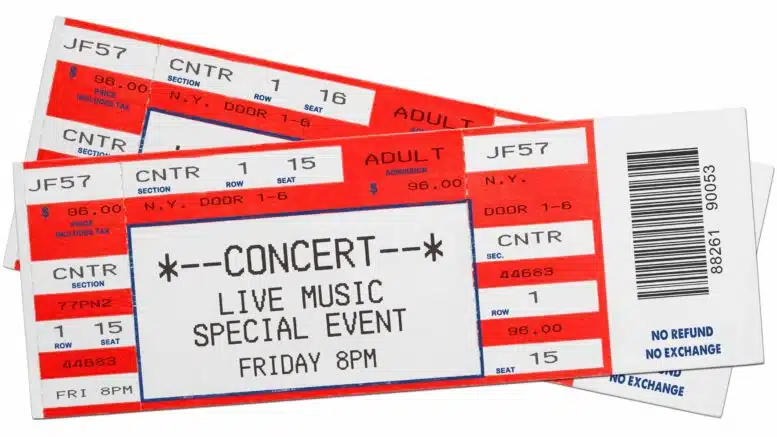Getting a ticket has never been harder—here’s how to arm yourself for the battle.
“Ticketmaster ought to look in the mirror and say, ‘I’m the problem, it’s me.’” This is just one of the many Taylor Swift song references U.S. senators made during the three-hour congressional hearing held late last year following the nightmarish experience fans (aka Swifties) endured trying to score tickets to her Eras Tour. … If you were one of the many people who waited in sometimes seven-hour-plus queues to score tix—only to have Ticketmaster cancel sales to the general public after extremely high demand—you know the incident all too well.
The T. Swift ticketing fiasco not only “broke live music,” but shined a spotlight on Ticketmaster parent company Live Nation Entertainment’s monopoly over concert ticketing.
“When you’re Live Nation and you have Ticketmaster as one of your companies, you own the relationship with the artist; you very often own the venue the artist is going to; and you own the ticketing,” says a local industry expert (who, along with their industry peers, asked to remain anonymous because the issue is so volatile). “Artists feel they cannot back out of this because if they don’t work with Live Nation, they’re not going to get the tours they want. And the building that’s owned by Live Nation has zero incentive to have anyone other than Ticketmaster do their ticketing because of the fees, so they’re allowed to play around with the prices. It’s the definition of a monopoly—and it’s the definition of unfair.”
Now, Queen Bey—aka now the most decorated artist in Grammy history (!)—is going on tour, and fans are yet again poised to flood ticketing sites in search of tickets to what might be the most highly anticipated concert of the year (Swifties, don’t @ us)—and will put Ticketmaster’s new verified fan system (fans will receive a code to join a lottery to get tickets) to the test. And though T. Swift fans brought Ticketmaster to court, “if you do the BeyHive dirty, all hell will break loose,” joked Entertainment Tonight co-host Kevin Frazier.
With Ticketmaster under fire and concert tickets about as hard to come by as cheap eggs (the next thing Swifties should tackle, according to Trevor Noah)—not to mention as expensive as your monthly rent payment—we took a deep dive into alternate ticketing websites and rounded up some helpful tips and tricks from local industry experts.
How to get tickets before they sell out?
Get on the email list of your local venues and fave artists. Many artists—as well as some major credit card companies—often offer presale access.
How to avoid buying resale tickets when first-sells are still available?
Either go through the venue’s website or the artist’s website—those will lead you to those primary ticket sources. Pay attention to the filters on your seat search and sort. Oftentimes, ‘best available’ is the automatic selection, but the best available might be resale tickets. And if a ticket price seems too high, that could be a sign of something fishy.
How to avoid getting scammed?
Beware of websites or individuals selling Verified Fan registrations, presale codes or lottery access; and persons who will not do a secure transaction. Know what kind of ticket applies to the venue, and make sure that’s what you’re getting. Additionally, always pay with a credit card (as opposed to debit card).
How to know if it’s a legit ticket site?
If you’re using Google, the first three or four links are often sponsored ads from third-party sellers. Also look out for ‘speculative ticketing,’ when third-party websites show tickets for sale before any presale or on-sale has occurred.
Why are there so many fees?!
In most contracts with artists, the maximum amount of money a venue can make is about 15% of the gross of the concert—so 85% goes to the artist—and if the show underperforms, the venue takes the hit. Many venues tack on fees as the extra couple dollars they make on those tickets are vital to their operation. The artist gets a percentage of the ticket revenue, but they don’t get a percentage of the fee revenue.
What’s the deal with third-party sites?
Some of these third-party sites came from the idea of ticket buyer freedom, fan freedom. It’s profitable. But a lot of them don’t even go out and buy the ticket ahead of time; they wait for some unsuspecting person to buy a ticket on their site, and they run over to the venue website and buy the ticket and then resell it. The third-party seller helps nobody but the third-party seller. It skews demand, perception and the value of what the ticket should be.

While Taylor Swift and Beyoncé are the leading ladies in the ticketing game, they’re (unfortunately) not coming to Raleigh. So, we chose the next hottest show, Lizzo, and selected a seat in the same section at PNC Arena using different ticketing links to compare and break down the prices.
Ticketmaster
From $64.50
Service fees: $23.72
Tax: $1.03
Total: $89.25
SeatGeek
From $94
Fees: $36.02
Tax: $9.43
Total: $130.45
Vivid Seats
From $97
Service fees: $31.05
Tax + delivery $11.96
Total: $140.01
Ticket City
From $97
Service charge: $29.10
Tax + delivery: $17.19
Total: $143.29
StubHub
From $105
Fees: $36
Tax: $10
Total: $151

